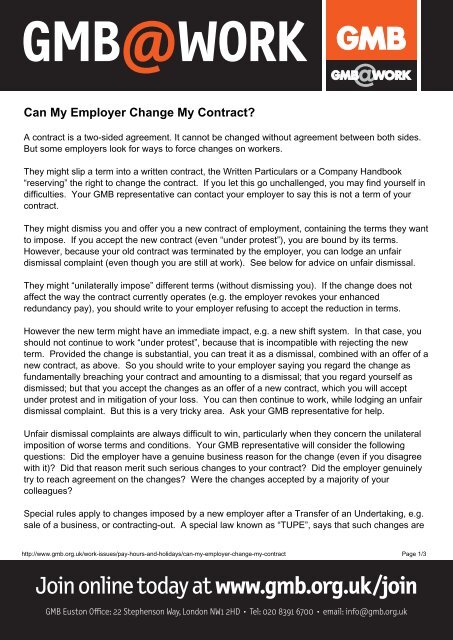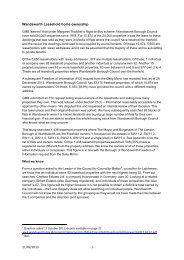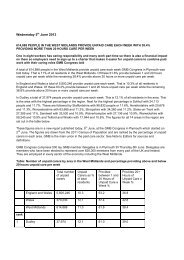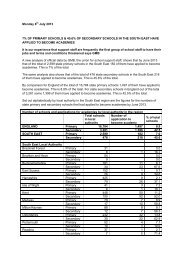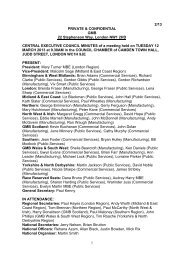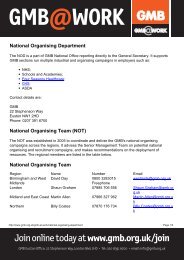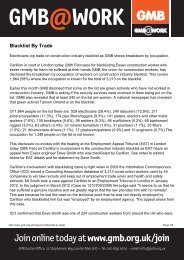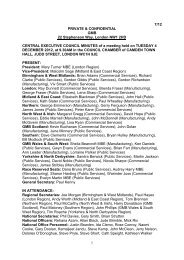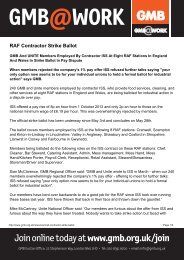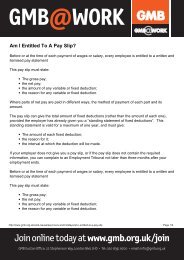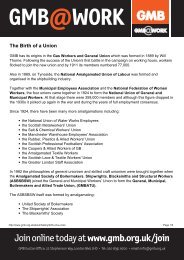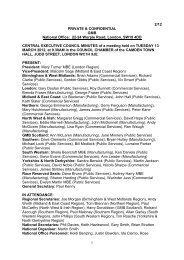Can My Employer Change My Contract?x - GMB
Can My Employer Change My Contract?x - GMB
Can My Employer Change My Contract?x - GMB
Create successful ePaper yourself
Turn your PDF publications into a flip-book with our unique Google optimized e-Paper software.
<strong>GMB</strong>@WORK<br />
<strong>Can</strong> <strong>My</strong> <strong>Employer</strong> <strong>Change</strong> <strong>My</strong> <strong>Contract</strong>?<br />
A contract is a two-sided agreement. It cannot be changed without agreement between both sides.<br />
But some employers look for ways to force changes on workers.<br />
They might slip a term into a written contract, the Written Particulars or a Company Handbook<br />
“reserving” the right to change the contract. If you let this go unchallenged, you may find yourself in<br />
difficulties. Your <strong>GMB</strong> representative can contact your employer to say this is not a term of your<br />
contract.<br />
They might dismiss you and offer you a new contract of employment, containing the terms they want<br />
to impose. If you accept the new contract (even “under protest”), you are bound by its terms.<br />
However, because your old contract was terminated by the employer, you can lodge an unfair<br />
dismissal complaint (even though you are still at work). See below for advice on unfair dismissal.<br />
They might “unilaterally impose” different terms (without dismissing you). If the change does not<br />
affect the way the contract currently operates (e.g. the employer revokes your enhanced<br />
redundancy pay), you should write to your employer refusing to accept the reduction in terms.<br />
However the new term might have an immediate impact, e.g. a new shift system. In that case, you<br />
should not continue to work “under protest”, because that is incompatible with rejecting the new<br />
term. Provided the change is substantial, you can treat it as a dismissal, combined with an offer of a<br />
new contract, as above. So you should write to your employer saying you regard the change as<br />
fundamentally breaching your contract and amounting to a dismissal; that you regard yourself as<br />
dismissed; but that you accept the changes as an offer of a new contract, which you will accept<br />
under protest and in mitigation of your loss. You can then continue to work, while lodging an unfair<br />
dismissal complaint. But this is a very tricky area. Ask your <strong>GMB</strong> representative for help.<br />
Unfair dismissal complaints are always difficult to win, particularly when they concern the unilateral<br />
imposition of worse terms and conditions. Your <strong>GMB</strong> representative will consider the following<br />
questions: Did the employer have a genuine business reason for the change (even if you disagree<br />
with it)? Did that reason merit such serious changes to your contract? Did the employer genuinely<br />
try to reach agreement on the changes? Were the changes accepted by a majority of your<br />
colleagues?<br />
Special rules apply to changes imposed by a new employer after a Transfer of an Undertaking, e.g.<br />
sale of a business, or contracting-out. A special law known as “TUPE”, says that such changes are<br />
http://www.gmb.org.uk/work-issues/pay-hours-and-holidays/can-my-employer-change-my-contract Page 1/3<br />
Join online today at www.gmb.org.uk/join<br />
<strong>GMB</strong> Euston Office: 22 Stephenson Way, London NW1 2HD • Tel: 020 8391 6700 • email: info@gmb.org.uk
<strong>GMB</strong>@WORK<br />
not binding, even if agreed by the workforce, because European law guarantees the same terms<br />
and conditions under the new employer. Your <strong>GMB</strong> representative has access to specialist advice<br />
on TUPE.<br />
A contract is a two-sided agreement. It cannot be changed without agreement between both sides.<br />
But some employers look for ways to force changes on workers.<br />
They might slip a term into a written contract, the Written Particulars or a Company Handbook<br />
“reserving” the right to change the contract. If you let this go unchallenged, you may find yourself in<br />
difficulties. Your <strong>GMB</strong> representative can contact your employer to say this is not a term of your<br />
contract.<br />
They might dismiss you and offer you a new contract of employment, containing the terms they want<br />
to impose. If you accept the new contract (even “under protest”), you are bound by its terms.<br />
However, because your old contract was terminated by the employer, you can lodge an unfair<br />
dismissal complaint (even though you are still at work). See below for advice on unfair dismissal.<br />
They might “unilaterally impose” different terms (without dismissing you). If the change does not<br />
affect the way the contract currently operates (e.g. the employer revokes your enhanced<br />
redundancy pay), you should write to your employer refusing to accept the reduction in terms.<br />
However the new term might have an immediate impact, e.g. a new shift system. In that case, you<br />
should not continue to work “under protest”, because that is incompatible with rejecting the new<br />
term. Provided the change is substantial, you can treat it as a dismissal, combined with an offer of a<br />
new contract, as above. So you should write to your employer saying you regard the change as<br />
fundamentally breaching your contract and amounting to a dismissal; that you regard yourself as<br />
dismissed; but that you accept the changes as an offer of a new contract, which you will accept<br />
under protest and in mitigation of your loss. You can then continue to work, while lodging an unfair<br />
dismissal complaint. But this is a very tricky area. Ask your <strong>GMB</strong> representative for help.<br />
Unfair dismissal complaints are always difficult to win, particularly when they concern the unilateral<br />
imposition of worse terms and conditions. Your <strong>GMB</strong> representative will consider the following<br />
questions: Did the employer have a genuine business reason for the change (even if you disagree<br />
with it)? Did that reason merit such serious changes to your contract? Did the employer genuinely<br />
try to reach agreement on the changes? Were the changes accepted by a majority of your<br />
colleagues?<br />
http://www.gmb.org.uk/work-issues/pay-hours-and-holidays/can-my-employer-change-my-contract Page 2/3<br />
Join online today at www.gmb.org.uk/join<br />
<strong>GMB</strong> Euston Office: 22 Stephenson Way, London NW1 2HD • Tel: 020 8391 6700 • email: info@gmb.org.uk
Powered by TCPDF (www.tcpdf.org)<br />
<strong>GMB</strong>@WORK<br />
Special rules apply to changes imposed by a new employer after a Transfer of an Undertaking, e.g.<br />
sale of a business, or contracting-out. A special law known as “TUPE”, says that such changes are<br />
not binding, even if agreed by the workforce, because European law guarantees the same terms<br />
and conditions under the new employer. Your <strong>GMB</strong> representative has access to specialist advice<br />
on TUPE.<br />
http://www.gmb.org.uk/work-issues/pay-hours-and-holidays/can-my-employer-change-my-contract Page 3/3<br />
Join online today at www.gmb.org.uk/join<br />
<strong>GMB</strong> Euston Office: 22 Stephenson Way, London NW1 2HD • Tel: 020 8391 6700 • email: info@gmb.org.uk


